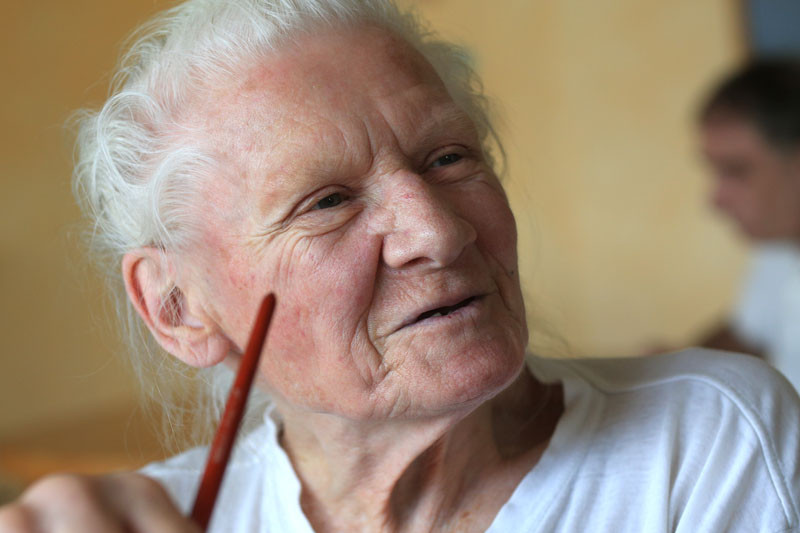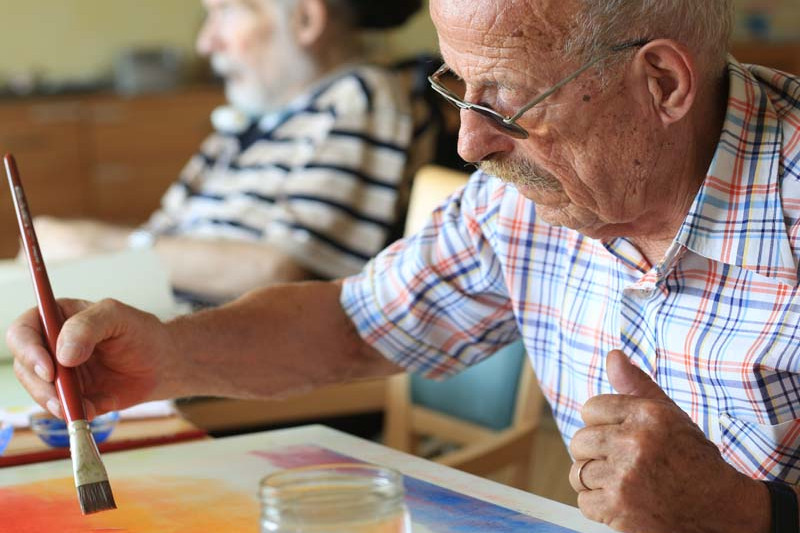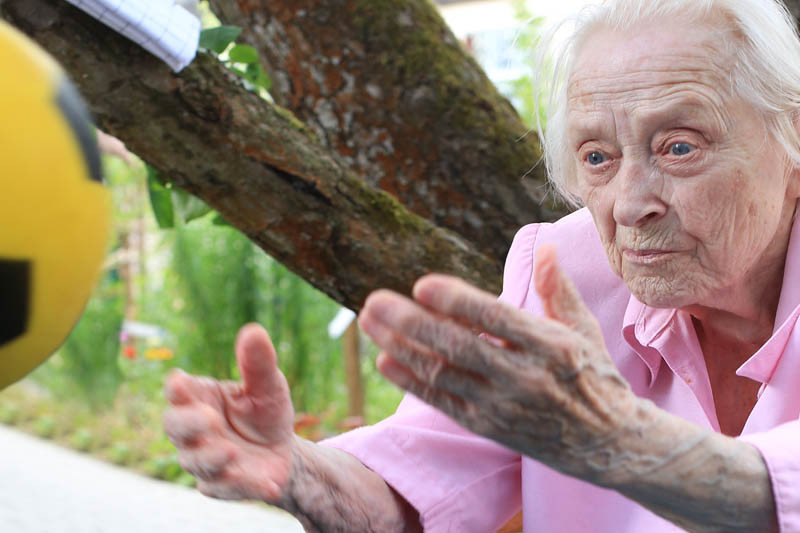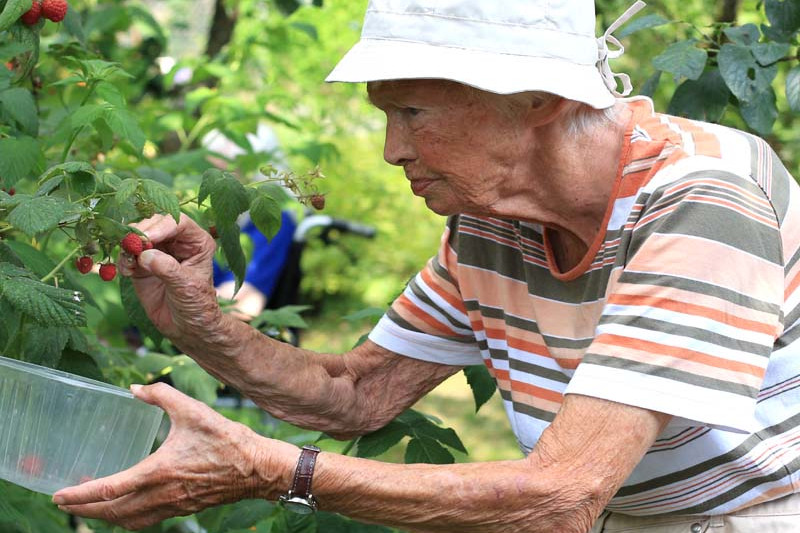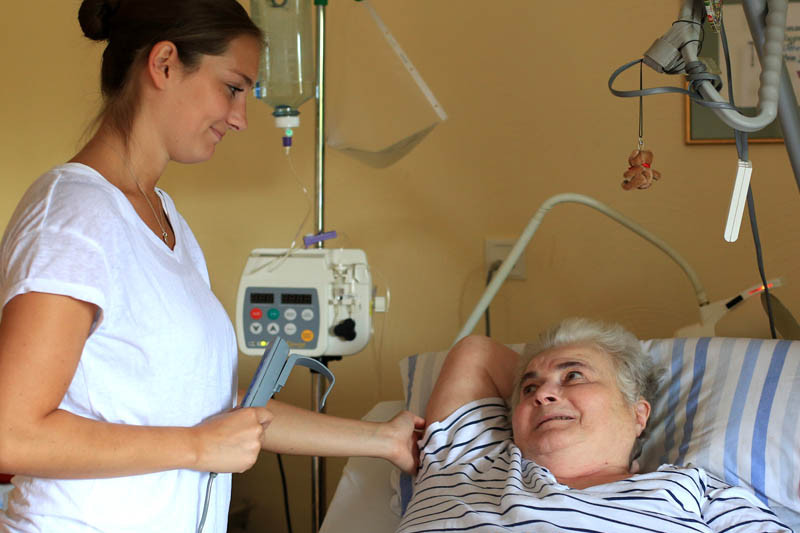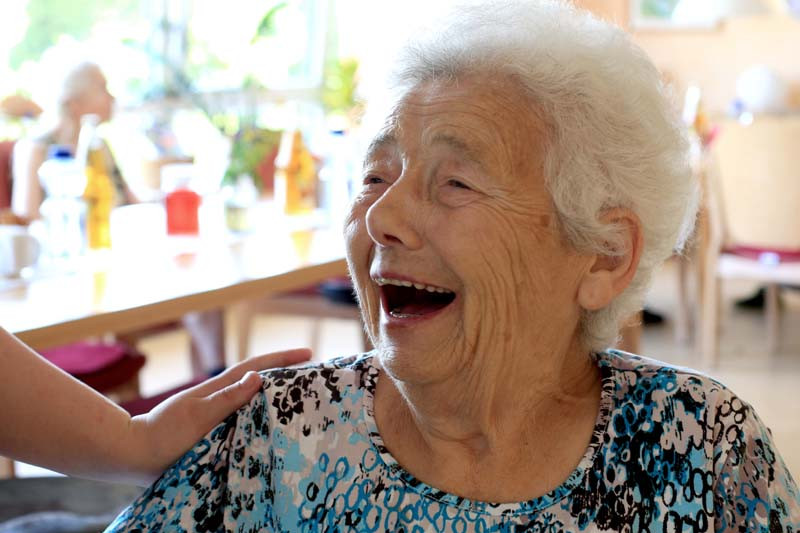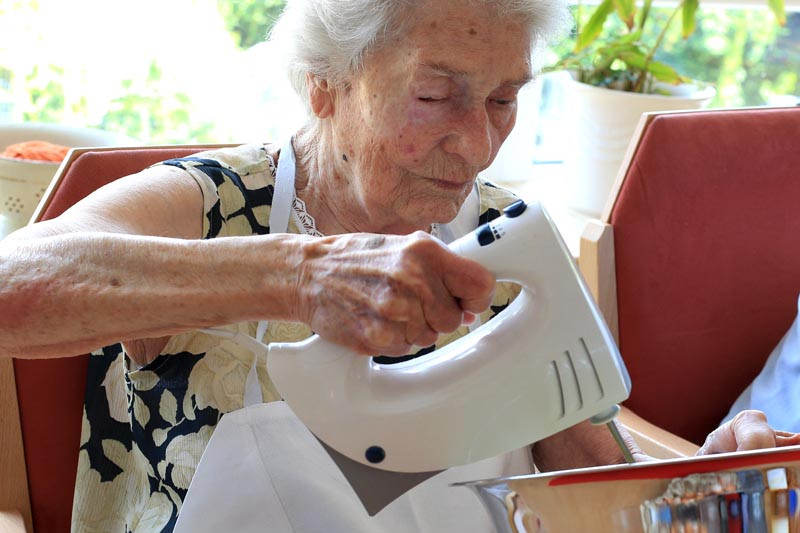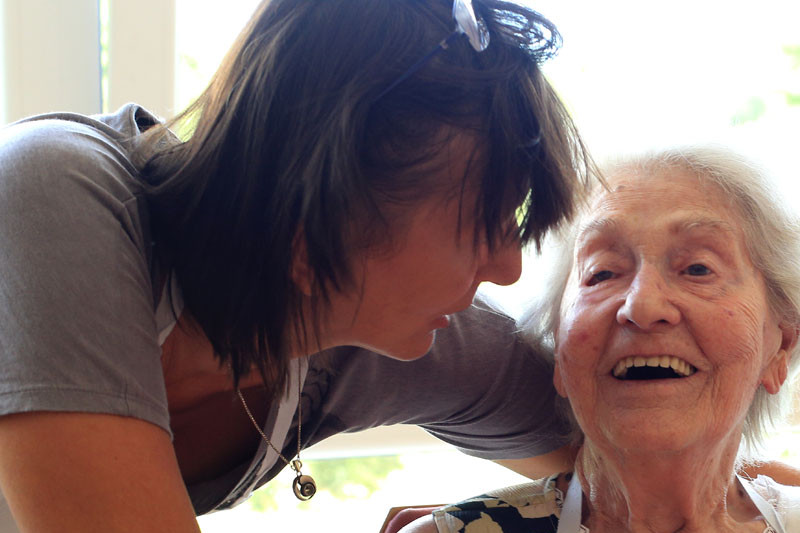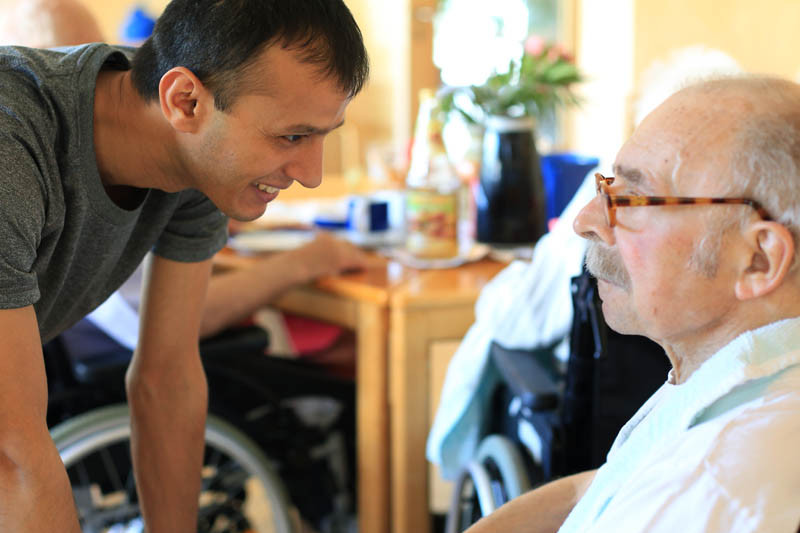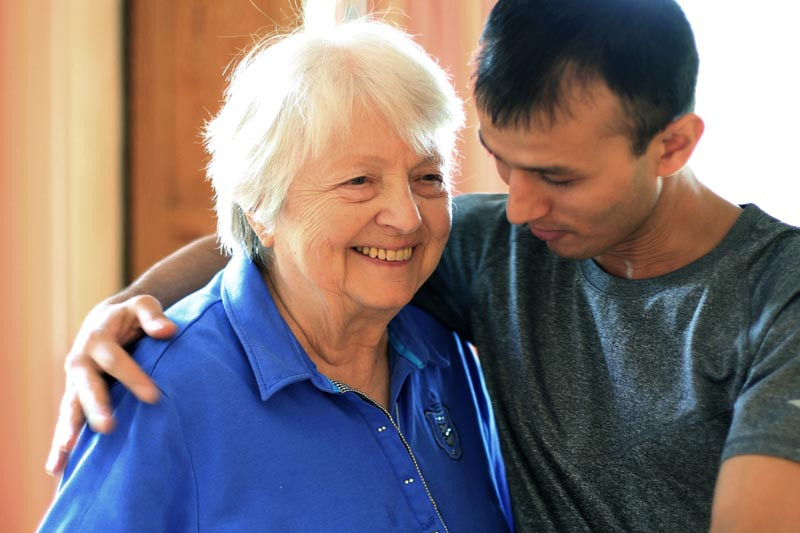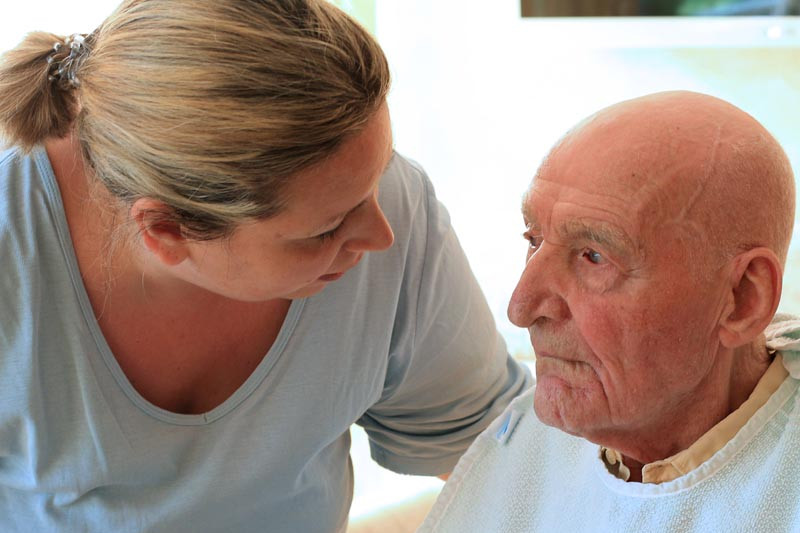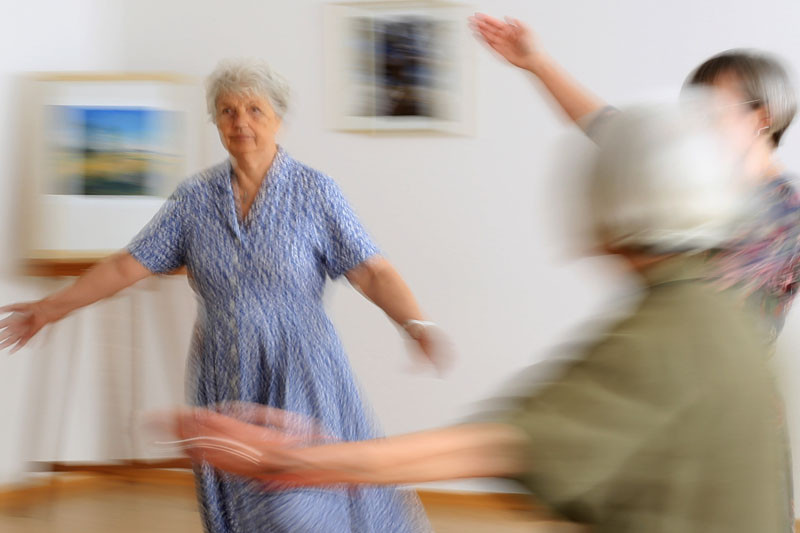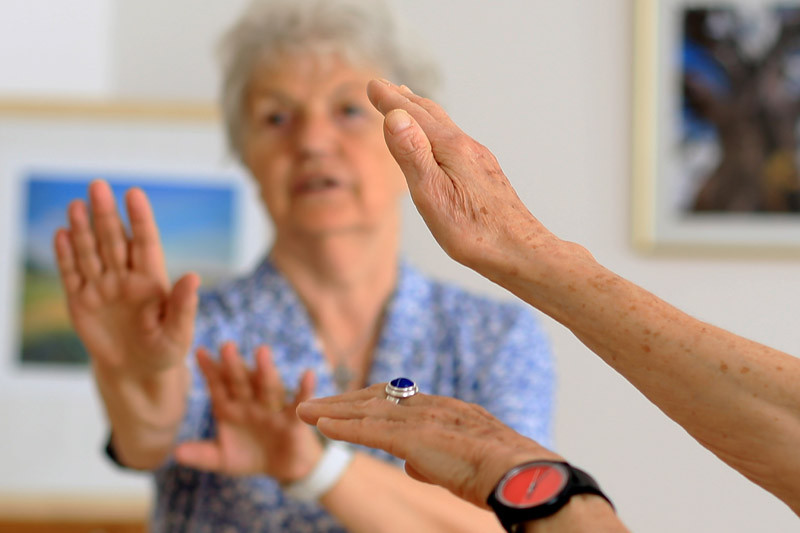“Our view of old age has got to change!” – Developing and maintaining relational abilities: Dealing with people with dementia
Working with individuals suffering from dementia is a great challenge for relatives and caregivers. In the Aja Textor-Goethe senior residence in Frankfurt am Main, exemplary work with dementia sufferers has been taking place for many years, and the topic is a major focus in their training seminar on elder care. In 2007, the multiple award-winning project “Aja's Garden House” opened, with living areas that each house eight dementia suffers with care needs. The Software AG Foundation has been supporting this exemplary institution for over 15 years. We spoke with different experts at the Aja Textor-Goethe residence about their views on dementia and the social questions that it raises.
What kind of understanding of the person defines your work with people suffering from dementia?
Uwe Scharf: To borrow the words of a Heinrich Zschokke, a contemporary of Goethe: The spirit does not get sick. In the case of persons with dementia, certain cognitive abilities are lost - but everything else, including emotional abilities, remains healthy. That's why we see it as our task to design spaces in which these individuals can find their way - an environment in which they can be reached and supported. But above all it is important to teach our employees that they can have relationships with the residents. Since the introduction of long-term care, the clientele in institutions like ours has changed dramatically: the individuals who come here are above all those who are unable to continue to live in a domestic situation because of orientation difficulties. And it has become clear that it doesn't work to attempt to force the individuals to adapt to the institution. Individuals with dementia simply refused, and thereby they changed the forms of care - a change which was previously not possible in the sociopolitical realm.
Sylvia Staehle: In the seminar, we communicate it this way: The “I” or the spirit is still there, but there is no longer a connection to the soul and the body. As a result, individuals are no longer able to control their feelings with their intellectual abilities, and the result is reactions that are sometimes incomprehensible to us. But when I know why this is the case, and I know that this behaviour - which may seem “crazy” to me - is not directed at me personally, then I can manage it better. I find it important not to deny that the dementia patient still has his spirit. I no longer need to understand why someone wants a certain thing or why he feels a certain way - I accept it as his truth. I can do this for the sake of the individual and his dignity.
Johannes Riesenberger: That's why the term “dementia” is, in my eyes, a non-thing. Literally translated it means “without mind” - and that's not true!
How does this perspective define your day-to-day care?
Annette Wittkamp: The heart of our work is to attempt to make contact with the other person and to have a genuine encounter with him or her. This is important when interacting with any human being, but in senior care it is especially important. In our experience, residents are often able to relax after a certain time here: they really arrive, and become visible again as human beings. We try to maintain this as well in our interactions with one another as employees.
From what you say, it is clear how important it is to accept dementia. Is it perhaps even possible to see a positive side to it?
Johannes Riesenberger: No one wants to give up their powers of self-control in old age, or to have to rely on a more or less purely emotional way of life. Yet we experience how dementia leads us back to our immediate, direct human qualities. Our employees must develop their own spiritual abilities in order to increase their tolerance and acceptance - one can certainly see this as a path of growth and development. People with dementia are able to tell exactly what another person intends: if I am in a hurry and attempt to organise the residents so that they come to dinner as quickly as possible, they notice it. Clearly, these individuals challenge us to shape our social relationships differently: in such a way that the environment is more manageable and is characterized by true appreciation. They help us to slow down and to rediscover qualities that have largely been lost due to industrialization and modernization.
What is the importance of dementia for the biography of an individual?
Uwe Scharf: With dementia, people sometimes develop abilities that had no place in their previous phases of life, or that weren't given sufficient space due to all kinds of demands. Then one may really have the impression that a person's biography becomes rounded out in this way.
Sylvia Staehle: All human beings attempt to cope with their past. A person suffering from dementia, who mainly lives on the level of feelings, copes with the emotional level. He can hopefully come to peace if he can accept emotional sides to himself that he previously suppressed.
Uwe Scharf: There are some indications that dementia can be connected to unprocessed traumatic experiences in earlier phases of someone's biography. In view of the war and post-war experiences of the generation that is now so massively affected by dementia, this seems plausible. At the time, they had no access to therapeutic help - perhaps dementia is one way to re-establish emotional balance? We attempt to offer support in this spirit, without offering ready-made answers. It is a way of seeking together- a research process.
How do you strike a balance between the desire to create a familiar environment and a personal atmosphere for residents, and the many bureaucratic regulations that make this work often difficult?
Annette Wittkamp: That's a daily struggle. In most senior care institutions, it's normal for one caregiver to care for between ten and fifteen individuals every morning. Older people are slow, and everything takes time - the 20 minutes allotted for each person are just not enough. For us, every area and every shift has an additional trainee; but the pressure is still high. How can one ever provide quality care, and in addition to the purely practical things also create emotional encounters? Here, our first line of work is relationships, for which one simply needs time.
Volunteers and relatives play an important role in ensuring high-quality relationships - how are they integrated?
Uwe Scharf: We've addressed this aspect in a new way with Aja's Garden House. There we have small apartments in which the dementia patients can feel safe and cared for, and where volunteers and relatives can also quickly find their bearings. We also created two part-time positions to coordinate the volunteer helpers and to clarify in initial discussions how we can best make use of their abilities. In the case of relatives it's similar - here, too, we do our best to involve them in life here as intensely as possible.
Annette Wittkamp: It's important that we develop a relationship with the relatives, as they are normally the people who are closest to the residents. When the relatives trust us, the residents are better able to relax. Many relatives have a bad conscience because they can no longer manage care at home. It's important to communicate to them that we recognize what they have already accomplished, but that it is also okay to take this next step.
There are plans to integrate the previously separate training programs for elderly care, childcare, and nursing care into one common training program. What do you think of this development?
Uwe Scharf: For senior care, this means that the field for caregivers is becoming more diverse and the relative role of nursing care for the sick is increasing. In addition, the entry requirements are increasing, as one needs a “Mittlere Reife” (secondary school) qualification. In elderly care, in recent years we were able to create a lower-threshold entry into the field thanks to the one-year nursing assistant training program as well as the Federal Voluntary Service (Bundesfreiwilligendienst). Most of the applicants for the three-year training program in elderly care don't have a secondary school qualification, so we could lose a large circle of applicants.
Sylvia Staehle: Training in relationship skills would be given hardly any time in such a generalized training program, and this would be above all a detriment to the dementia patients. We would need to give our employees additional training - but who is going to finance that?
Uwe Scharf: This will be a great challenge for elderly care and for anthroposohically-oriented care institutions. In Germany, we only have five locations that offer training based on an anthroposophical understanding of the person. It's not clear whether we will be able to maintain the work at all of these locations, and what effects these changes might have. These new caregivers (“Pflegefachmänner” or “Pflegefachfrauen,” as they will be called) will, in the course of a three-year training, probably only have one single practical placement in elderly care, which is of course not enough.
In view of demographic developments, we have to assume that the number of dementia patients will continue to increase quickly - and thus the challenge to our society to cope with this will increase too. What are, in your view, the most important aspects that need to change?
Uwe Scharf: Our view of old age has to change. If we assume that old age and even dementia can be an important way to round out a person's biography, then it is a phase of development in which we should support and guide individuals, and not only offer them provisional care. We also obtain a different perspective if we assume that we repeat our lives on earth. In a Buddhist or Hindu cultural view, there is a belief that the time and circumstances of death have great importance for the next life.
I think that in the future we will continue to need a targeted training for relationship skills so that we can establish and maintain relationships with dementia patients in their otherness. If this is lost in a general training program, then we will have to find other ways to develop it. The goal is to design community life in a human, caring way and to expand this work with a view towards a spiritual understanding of the person. When we view individuals as beings who are always in development - including after death - only then do we realize the real meaning as well as the future perspectives for this social form.
Thanks for the interesting discussion!
Discussion partners:
Johannes Riesenberger, Social Services
Uwe Scharf, Home Director and Business Manager
Sylvia Staehle, Seminar Manager
Annette Wittkamp, Head of Care Services
Questions asked by Elke Rahmann and Konrad Lampart, project managers, Software AG Foundation.
Links:

